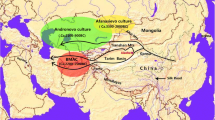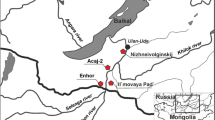Abstract
The current limitation of ancient DNA data from Vietnam led to the controversy surrounding the prehistory of people in this region. The combination of high heat and humidity damaged ancient bones that challenged the study of human evolution, especially when using DNA as study materials. So far, only 4 k years of history have been recorded despite the 65 k years of history of anatomically modern human occupations in Vietnam. Here we report, to our knowledge, the oldest mitogenomes of two hunter-gatherers from Vietnam. We extracted DNA from the femurs of two individuals aged 6.2 k cal BP from the Con Co Ngua (CCN) site in Thanh Hoa, Vietnam. This archeological site is the largest cemetery of the hunter-gatherer population in Southeast Asia (SEA) that was discovered, but their genetics have not been explored until the present. We indicated that the CCN haplotype belongs to a rare haplogroup that was not detected in any present-day Vietnamese individuals. Further matrilineal analysis on CCN mitogenomes showed a close relationship with ancient farmers and present-day populations in SEA. The mitogenomes of hunter-gatherers from Vietnam debate the “two layers” model of peopling history in SEA and provide an alternative solution for studying challenging ancient human samples from Vietnam.






Similar content being viewed by others
Data availability
Data are available on request.
References
Andrews RM, Kubacka I, Chinnery PF et al (1999) (1999) Reanalysis and revision of the Cambridge reference sequence for human mitochondrial DNA. Nat Genet 232(23):147–147. https://doi.org/10.1038/13779
Bandelt HJ, Forster P, Rohl A (1999) Median-joining networks for inferring intraspecific phylogenies. Mol Biol Evol 16:37–48. https://doi.org/10.1093/OxfordJournals.Molbev.A026036
Behar DM, van Oven M, Rosset S et al (2012) A “Copernican” reassessment of the human mitochondrial DNA tree from its root. Am J Hum Genet 90:675–684. https://doi.org/10.1016/J.AJHG.2012.03.002
Bouckaert R, Vaughan TG, Barido-Sottani J et al (2019) BEAST 2.5: An advanced software platform for Bayesian evolutionary analysis. PLOS Comput Biol 15:1006650. https://doi.org/10.1371/JOURNAL.PCBI.1006650
Carlhoff S, Duli A, Nägele K et al (2021) (2021) Genome of a middle Holocene hunter-gatherer from Wallacea. Nat 5967873(596):543–547. https://doi.org/10.1038/s41586-021-03823-6
Ciochon R, Long VT, Larick R et al (1996) Dated co-occurrence of Homo erectus and Gigantopithecus from Tham Khuyen Cave. Vietnam Proc Natl Acad Sci 93:3016–3020. https://doi.org/10.1073/PNAS.93.7.3016
Delfin F, Min-Shan Ko A, Li M, Gunnarsdóttir ED, Tabbada KA, Salvador JM, Calacal GC, Sagum MS, Datar FA, Padilla SG, et al (2014) Complete mtDNA genomes of Filipino ethnolinguistic groups: a melting pot of recent and ancient lineages in the Asia-Pacific region. Eur J Hum Genet 22:228–237. https://www.nature.com/articles/ejhg2013122
Duong NT, Macholdt E, Ton ND et al (2018a) (2018) Complete human mtDNA genome sequences from Vietnam and the phylogeography of Mainland Southeast Asia. Sci Reports 81(8):1–13. https://doi.org/10.1038/s41598-018-29989-0
Duong NT, Macholdt E, Ton ND, Arias L, Schröder R, Van Phong N, Thi Bich Thuy V, Ha NH, Thi Thu Hue H, Thi Xuan N, et al. 2018b. Complete human mtDNA genome sequences from Vietnam and the phylogeography of Mainland Southeast Asia. Sci Reports. 2018b 81 [Internet] 8:1–13. Available from: https://www.nature.com/articles/s41598-018-29989-0
Excoffier L, Lischer HEL (2010) Arlequin suite ver 3.5: a new series of programs to perform population genetics analyses under Linux and Windows. Mol Ecol Resour 10:564–567. https://doi.org/10.1111/j.1755-0998.2010.02847.x
Fairley S, Lowy-Gallego E, Perry E, Flicek P (2020) The International genome sample resource (IGSR) collection of open human genomic variation resources. Nucleic Acids Res 48:D941–D947. https://doi.org/10.1093/NAR/GKZ836
Fu Q, Mittnik A, Johnson PLF et al (2013) A revised timescale for human evolution based on ancient mitochondrial genomes. Curr Biol 23:553–559. https://doi.org/10.1016/J.CUB.2013.02.044
Gandini F, Achilli A, Pala M et al (2016) Mapping human dispersals into the Horn of Africa from Arabian Ice Age refugia using mitogenomes. Sci Rep 6:25472. https://doi.org/10.1038/srep25472
Gunnarsdo ED, Li M, Bauchet M, Finstermeier K, Stoneking M (2011) High-throughput sequencing of complete human mtDNA genomes from the Philippines. Genome Res 21:1
Gunnarsdóttir ED, Nandineni MR, Li M, Myles S, Gil D, Pakendorf B, Stoneking M. 2011. Larger mitochondrial DNA than Y-chromosome differences between matrilocal and patrilocal groups from Sumatra. Nat Commun. [Internet] 2. Available from: https://pubmed.ncbi.nlm.nih.gov/21407194/
Jinam TA, Hong L-C, Phipps ME, Stoneking M, Ameen M, Edo J, Consortium HP-AS, Saitou N. 2012. Evolutionary History of Continental Southeast Asians: “Early Train” Hypothesis Based on Genetic Analysis of Mitochondrial and Autosomal DNA Data. Mol Biol Evol. [Internet] 29:3513–3527. Available from: https://academic.oup.com/mbe/article/29/11/3513/1158983
Jones RK (2017) Transitions to animal domestication in Southeast Asia: Zooarchaeological analysis of Cồn Cổ Ngựa and Mán Bạc, Vietnam. The Australian National University, Canberra, ACT
Jónsson H, Ginolhac A, Schubert M et al (2013) mapDamage2.0: fast approximate Bayesian estimates of ancient DNA damage parameters. Bioinformatics 29:1682–1684. https://doi.org/10.1093/BIOINFORMATICS/BTT193
Kampuansai JW, Srikummool M, Kangwanpong D, Ghirotto S, Brunelli A, Stoneking M. 2017. Complete mitochondrial genomes of Thai and Lao populations indicate an ancient origin of Austroasiatic groups and demic diffusion in the spread of Tai–Kadai languages. Hum Genet. [Internet] 136:85. Available from: http://www.ncbi.nlm.nih.gov/pubmed/27837350
Kearse M, Moir R, Wilson A et al (2012) Geneious Basic: an integrated and extendable desktop software platform for the organization and analysis of sequence data. Bioinformatics 28:1647–1649. https://doi.org/10.1093/BIOINFORMATICS/BTS199
Kloss-Brandstätter A, Summerer M, Horst D, Horst B, Streiter G, Raschenberger J, Kronenberg F, Sanguansermsri T, Horst J, Weissensteiner H. 2021. An in-depth analysis of the mitochondrial phylogenetic landscape of Cambodia. Sci. Reports 2021 111 [Internet] 11:1–10. Available from: https://www.nature.com/articles/s41598-021-90145-2Kutanan
Ko AMS, Chen CY, Fu Q, Delfin F, Li M, Chiu HL, Stoneking M, Ko YC (2014) Early austronesians: Into and out of Taiwan. Am J Hum Genet. [Internet] 94:426–436. Available from: http://www.cell.com/article/S0002929714000615/fulltext
Kutanan W, Kampuansai J, Srikummool M, Kangwanpong D, Ghirotto S, Brunelli A, Stoneking M (2017) Complete mitochondrial genomes of Thai and Lao populations indicate an ancient origin of Austroasiatic groups and demic diffusion in the spread of Tai–Kadai languages Hum Genet 136(1):85–98. https://doi.org/10.1007/s00439-016-1742-y
Kutanan W, Shoocongdej R, Srikummool M, Hübner A, Suttipai T, Srithawong S, Kampuansai J, Stoneking M (2020) Cultural variation impacts paternal and maternal genetic lineages of the Hmong-Mien and Sino-Tibetan groups from Thailand. Eur J Hum Genet 28:1563–1579. https://doi.org/10.1038/s41431-020-0693-x
Li H, Durbin R (2009) Fast and accurate short read alignment with Burrows-Wheeler transform. Bioinformatics 25:1754–1760. https://doi.org/10.1093/BIOINFORMATICS/BTP324
Li H, Handsaker B, Wysoker A et al (2009) The sequence alignment/map format and SAMtools. Bioinformatics 25:2078–2079. https://doi.org/10.1093/BIOINFORMATICS/BTP352
Lipson M, Cheronet O, Mallick S et al (2018) Ancient genomes document multiple waves of migration in Southeast Asian prehistory. Science 80(361):92–95. https://doi.org/10.1126/science.aat3188
Liu D, Nguyen TD, Nguyen DT et al (2020) Extensive ethnolinguistic diversity in Vietnam reflects multiple sources of genetic diversity. Mol Biol Evol 37(9):2503–2519. https://doi.org/10.1093/molbev/msaa099
Liu Y, Wang T, Wu X et al (2021) Maternal genetic history of southern East Asians over the past 12,000 years. J Genet Genomics 48:899–907. https://doi.org/10.1016/J.JGG.2021.06.002
Matsumura H, Oxenham M, Nguyen LC (2015) Hoabinhians: A key population with which to debate the peopling of Southeast Asia. In: Kaifu Y, Izuho M, Goebel T et al (eds) Emergence and diversity of modern human behavior in Paleolithic Asia. A&M press, Texas, pp 117–132
Matsumura H, Hung H, Higham C et al (2019) Craniometrics reveal “two layers” of prehistoric human dispersal in eastern Eurasia. Sci Rep 9:1451. https://doi.org/10.1038/s41598-018-35426-z
Matsumura H, Xie G, Nguyen LC et al (2021) (2021) Female craniometrics support the ‘two-layer model’ of human dispersal in Eastern Eurasia. Sci Reports 111(11):1–13. https://doi.org/10.1038/s41598-021-00295-6
McColl H, Racimo F, Vinner L et al (2018) The prehistoric peopling of Southeast Asia. Science 361:88–92. https://doi.org/10.1126/science.aat3628
Narasimhan VM, Patterson N, Moorjani P et al (2019) The formation of human populations in South and Central Asia. Science 80:365. https://doi.org/10.1126/science.aat7487
Okonechnikov K, Golosova O, Fursov M (2012) Unipro ugene: a unified bioinformatics toolkit. Bioinformatics 28:1166–1167. https://doi.org/10.1093/BIOINFORMATICS/BTS091
Oxenham MF, Trinh HH, Willis A et al (2018) Between foraging and farming: strategic responses to the holocene thermal maximum in Southeast Asia. Antiquity 92:940–957. https://doi.org/10.15184/AQY.2018.69
Pedro N, Brucato N, Fernandes V, André M, Saag L, Pomat W, Besse C, Boland A, Deleuze JF, Clarkson C, et al. 2020. Papuan mitochondrial genomes and the settlement of Sahul. J Hum Genet. 2020 6510 [Internet] 65:875–887. Available from: https://www.nature.com/articles/s10038-020-0781-3
Pischedda S, Barral-Arca R, Gómez-Carballa A et al (2017) Phylogeographic and genome-wide investigations of Vietnam ethnic groups reveal signatures of complex historical demographic movements. Sci Rep 7:1–15. https://doi.org/10.1038/s41598-017-12813-6
Posth C, Wißing C, Kitagawa K et al (2017) (2017) Deeply divergent archaic mitochondrial genome provides lower time boundary for African gene flow into Neanderthals. Nat Commun 81(8):1–9. https://doi.org/10.1038/ncomms16046
Prüfer K, Racimo F, Patterson N et al (2014) The complete genome sequence of a Neanderthal from the Altai Mountains. Nature 505:43–49. https://doi.org/10.1038/nature12886
Renaud G, Slon V, Duggan AT (2015) Kelso J (2015) Schmutzi: estimation of contamination and endogenous mitochondrial consensus calling for ancient DNA. Genome Biol 161(16):1–18. https://doi.org/10.1186/S13059-015-0776-0
Scott RM, Buckley HR, Domett K et al (2019) Domestication and large animal interactions: Skeletal trauma in northern Vietnam during the hunter-gatherer Da But period. PLoS ONE 14:e0218777. https://doi.org/10.1371/JOURNAL.PONE.0218777
Shinoda K-I 8 Mitochondrial DNA of Human Remains at Man Bac
Summerer M, Horst J, Erhart G, Weißensteiner H, Schönherr S, Pacher D, Forer L, Horst D, Manhart A, Horst B et al (2014) Large-scale mitochondrial DNA analysis in Southeast Asia reveals evolutionary effects of cultural isolation in the multi-ethnic population of Myanmar. BMC Evol Biol 14:1–12. https://doi.org/10.1186/1471-2148-14-17
Ta MTA, Nguyen NN, Tran DM et al (2021) Massively parallel sequencing of human skeletal remains in Vietnam using the precision ID mtDNA control region panel on the Ion S5™ system. Int J Leg Med 2021:1–10. https://doi.org/10.1007/S00414-021-02649-1
Tanaka M, Cabrera VM, González AM, Larruga JM, Takeyasu T, Fuku N, Guo LJ, Hirose R, Fujita Y, Kurata M, Shinoda KI (2004) Mitochondrial genome variation in eastern Asia and the peopling of Japan. Genome Res 14(10a):1832–1850
Trinh HH, Huffer D (2015) THE Đa Bút period In Northern Vietnam: current knowledge and future directions. J Indo-Pacific Archaeol 35:36–47. https://doi.org/10.7152/JIPA.V35I0.14894
van Oven M, Kayser M (2009) Updated comprehensive phylogenetic tree of global human mitochondrial DNA variation. Hum Mutat 30:2. https://doi.org/10.1002/HUMU.20921
Wang T, Wang W, Xie G et al (2021) Human population history at the crossroads of East and Southeast Asia since 11,000 years ago. Cell 184:3829-3841.e21. https://doi.org/10.1016/J.CELL.2021.05.018
Weissensteiner H, Pacher D, Kloss-Brandstätter A et al (2016) HaploGrep 2: mitochondrial haplogroup classification in the era of high-throughput sequencing. Nucleic Acids Res 44:W58–W63. https://doi.org/10.1093/NAR/GKW233
Zhang X, Li C, Zhou Y, Huang J, Yu T, Liu X, Shi H, Liu H, Chia S, Huang S, Guo Y, Shoocongdej R, Ji X, Su B (2020) A matrilineal genetic perspective of hanging coffin custom in southern China and northern Thailand. Iscience. 23(4):101032. https://doi.org/10.1016/j.isci.2020.101032
Acknowledgements
We thank the support from the Institute of Archeology's team for sampling works from archeological sites.
Funding
This work was supported by the Vietnam Academy of Science and Technology project: “Study of ancient DNA extraction and sequencing of archeological human remains in Vietnam” (grant number. DL0000.08/20–23).
Author information
Authors and Affiliations
Contributions
Conceptualization: LHT, and LTL; methodology: HMP, LTL and HMT; formal analysis: LHT and HMP; investigation: LHT, HH; data curation: TTP, HMN and HMT; writing—original draft: LHT; writing—review & editing: NTD, DTL, HHC and HH; visualization: HMP and NTD; project administration: HH
Corresponding author
Ethics declarations
Conflict of interest
All authors declare they have no relevant financial or non-financial interests.
Additional information
Communicated by Shuhua Xu.
Publisher's Note
Springer Nature remains neutral with regard to jurisdictional claims in published maps and institutional affiliations.
Supplementary Information
Below is the link to the electronic supplementary material.

Rights and permissions
Springer Nature or its licensor (e.g. a society or other partner) holds exclusive rights to this article under a publishing agreement with the author(s) or other rightsholder(s); author self-archiving of the accepted manuscript version of this article is solely governed by the terms of such publishing agreement and applicable law.
About this article
Cite this article
Tran, H.L., Mai, H.P., Le Thi, D. et al. The first maternal genetic study of hunter-gatherers from Vietnam. Mol Genet Genomics 298, 1225–1235 (2023). https://doi.org/10.1007/s00438-023-02050-0
Received:
Accepted:
Published:
Issue Date:
DOI: https://doi.org/10.1007/s00438-023-02050-0




